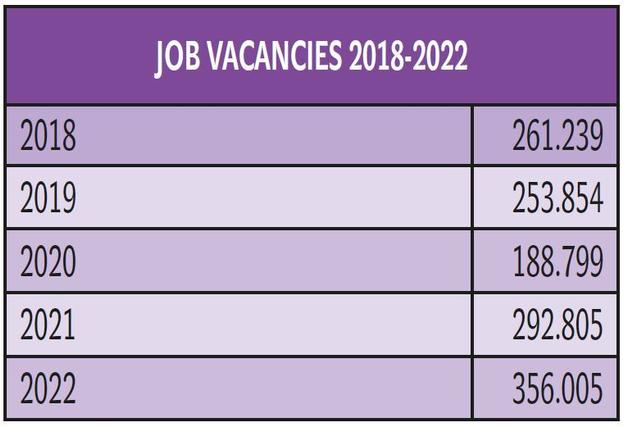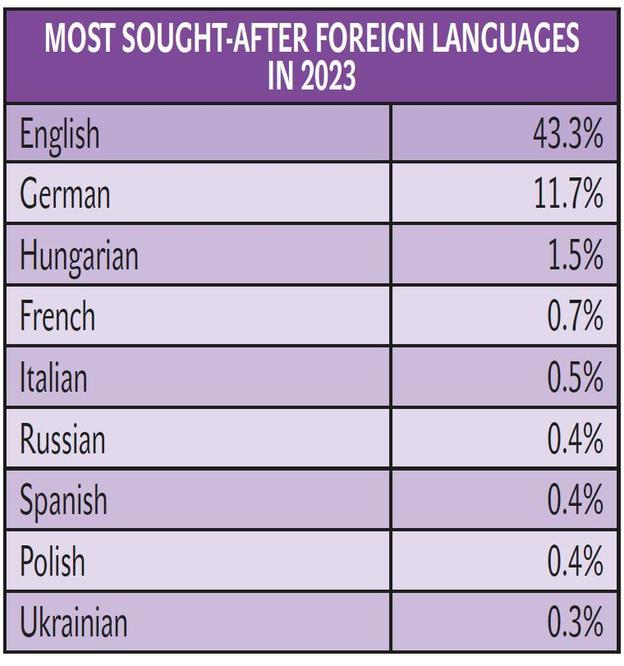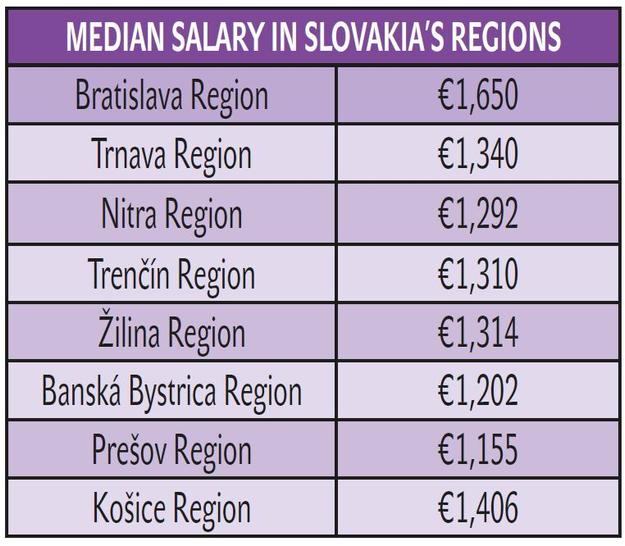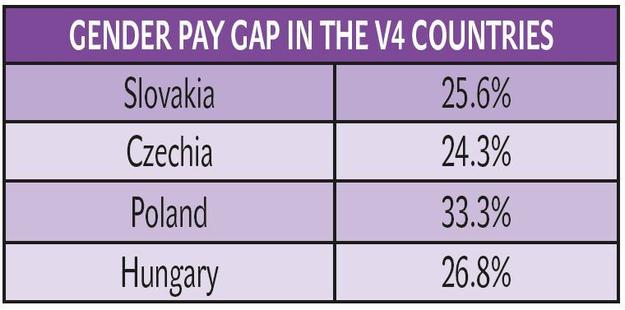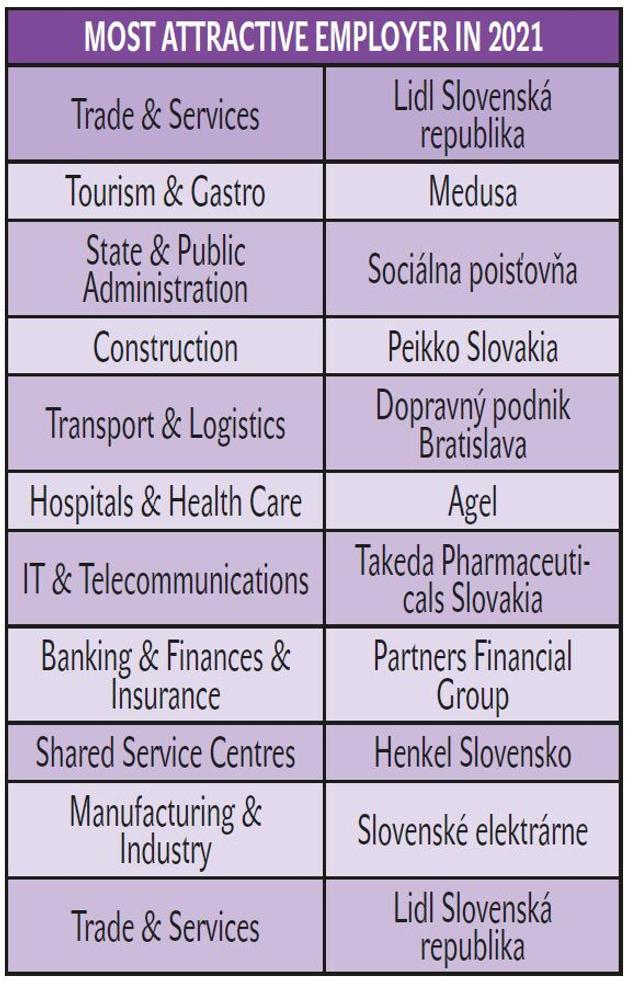This article was published in the Career & Employment Guide 2023, our special annual publication focused on the labour market, human resources and education.
Employers in Slovakia published more than 350,000 job vacancies on the largest jobs website in the country, Profesia.sk, in 2022. It was the biggest annual total in the site’s history. The number of job ads increased by more than one-fifth compared to the previous year. The most job offers were published in trade, manufacturing and IT.Employers in Slovakia published more than 350,000 job vacancies on the largest jobs website in the country, Profesia.sk, in 2022. It was the biggest annual total in the site’s history. The number of job ads increased by more than one-fifth compared to the previous year. The most job offers were published in trade, manufacturing and IT.
Most employers in Slovakia require job applicants to speak English as a foreign language. This request appeared in more than 43 percent of job ads published on Profesia.sk between the beginning of 2023 and mid March of the same year. The second most sought-after foreign language is German (12 percent). English is mostly required in IT (90 percent of job offers), followed by law, telecommunications, marketing and HR.
HR events in Slovakia
Awards
January: Najzamestnávateľ; www.najzamestnavatel.sk
January: Top Employer Slovakia; www.top-employers.com
May:Via Bona Slovakia – Outstanding Employer; www.nadaciapontis.sk
June:HRLeaders & HRTalent www.theleaders.sk
Sep:HR Inšpirácia; www.hrcomm.sk/hr-inspiracia
Autumn:Leading HR Organisation; www.pwc.com/sk
Conferences
March: People Business Summit; www.smekonferencie.sk; Bratislava
April:Conference Chopok I www.hrcomm.sk; Demänovská Dolina
May:HeRo; hero.dashofer.sk; Modra
May:HR Fórum; www.pannonhrforum.com; Dunajská Streda
May:Softip HR Day; www.softip.sk; Sliač
June:The Leaders Conference; www.theleaders.sk; Bratislava
October:Conference Chopok II; www.hrcomm.sk; Demänovská Dolina
October: e-learnmedia CAFÉ; www.e-learnmedia.cafe; Bratislava
October:HR trendy; www.hnonline.sk/konferencie; Bratislava
December:HR manažment; www.trendkonferencie.sk; Bratislava
Job fairs
March:Deň absolventov; kariera.euba.sk/veltrhy-prace; Bratislava
March:Kariéra EXPO; karieraexpo.zoznam.sk; Nitra
March:Night of Chances IT; nightofchances.com/it/; Bratislava
April:Night of Chances Law;nightofchances.com/law/; Bratislava
May:Profesia days; www.profesiadays.sk; Bratislava
June:Kariéra EXPO;karieraexpo.zoznam.sk; Košice
October:Job Forum Trenčín; www.expocenter.sk; Trenčín
October:Kariéra EXPO; karieraexpo.zoznam.sk; Bratislava
October:Kariérna cesta; kariera.euba.sk/veltrhy-prace; Bratislava
Employers in Slovakia are most interested in computer science graduates, judging by the average number of times their CVs are checked by average: nearly five. Construction and mechanical engineering graduates also catch a lot of attention, based on Profesia’s data. As for universities, employers mostly search for graduates of the Slovak University of Technology (STU) in Bratislava, with four companies on average looking at each STU graduate’s CV. Graduates of the University of Economics in Bratislava came in second.
Altogether, 36,188 job offers published on Profesia.sk between late February 2022 and the end of January 2023 had a Ukrainian flag – meaning that they were jobs suitable for Ukrainians – representing about one in 10 job ads. At the same time, nearly 8,500 Ukrainians created and published their CVs on the website. Nearly one half stated that they have a university education, while some 64 percent of CVs were submitted by women. They were most interested in working in the fields of commerce, tourism, gastronomy and ancillary works.
As many as 29 percent of employers in Slovakia expect their employee numbers to increase, while 18 percent predict they will drop, and 46 percent expect no change at all. This stems from the ManpowerGroup Employment Outlook Survey for the second quarter of 2023. The seasonally adjusted Net Employment Outlook in Slovakia stands at 10 percent, with the highest being in Bratislava and western Slovakia (12 percent each), and the lowest in eastern Slovakia (4 percent).
Diversity in the workplace
People from the LGBTI+ community are the least accepted group in the workplace. Only one-third of employees without direct experience with the community perceives such staff members positively or indicates a willingness to cooperate with them. This stems from a survey carried out by Profesia, with more than 4,300 respondents participating, and focused on attitudes towards the LGBTI+ community, disabled people, people belonging to national or ethnic minorities, foreigners, the older generation and people with small children. At the same time, one in 10 employees have experience of discrimination at work.
The difference in the hourly wage of men and women in 2021 amounted to 16.6 percent. To make the same monthly salaries as their male colleagues, the working week of a woman would have to last, on average, 46 hours and 38 minutes instead of 40 hours, according to data from the National Bank of Slovakia, the country’s central bank.
Slovakia scored 56 out of 100 points in the 2022 edition of the Gender Equality Index, issued by the European Institute for Gender Equality, ranking 24th in the EU. It fell 12.6 points behind the EU-wide average. The country’s score and ranking have remained the same since 2019.
Women in Slovakia receive €1,407 in gross monthly earnings on average, about one quarter less than men, who receive €1,896 on average, according to an analysis published by the Platy.sk website. A similar gender gap can be seen in Czechia and Hungary, while in Poland the difference is as much as 33 percent.
Development of salaries
The nominal monthly wage for 2022 amounted to €1,304, up 7.7 percent year-on-year. Real wage declined by 4.5 percent. Since price growth was faster, employees in almost all sectors earned less in real terms than in 2021, according to the Statistics Office.
The median salary in Slovakia stood at €1,350 gross in 2022, meaning that 50 percent of people working in the country had a lower basic salary than this sum, according to the Platy.sk analysis. One in 10 Slovaks earned less than €840 gross, while one in 10 Slovaks received more than €2,550 gross.
Salaries kept rising consistently in 2022, across different fields of employment and across Slovakia’s geographical regions. Yet these increases could not fully cover the cost of inflation. Companies will try to compensate for this with non-monetary rewards; at the same time, the unemployment rate should not increase significantly, the Grafton Slovakia recruitment agency wrote in its extensive salary survey carried out in the second quarter of 2022.
Working conditions
The labour market has undergone several significant changes during the pandemic, and changes can also be seen in workplaces. Several employers said in a survey carried out by Profesia in cooperation with Slovenská Sporiteľňa, the largest commercial bank in Slovakia, that they have noticed changes in their employees’ behaviour; in most cases slightly negative. As many as 75 percent of companies observed lower satisfaction among their staff at work, followed by lower motivation to work (71 percent), and the loss of work enthusiasm and engagement (70 percent). On the other hand, many people changed their work and life priorities. Building relationships with friends and family was more important for 29 percent of respondents.
More than 24,000 job ads published on Profesia.sk between January 1 and August 16, 2022 offered part-time work to job applicants. Of all job offers published, about one in 10 is open to shortened working hours; most of them were published in the fields of trade, tourism, gastronomy and administration. Companies offering more flexible working hours received more CVs from applicants – about 22 people responded to each such offer in 2022.
Despite substantial numbers of vacancies in Slovakia, fewer people are applying. Moreover, jobseekers have become more picky, an analysis by the Association of Recruitment Agencies of Slovakia (APAS) showed. Even though job applicants look at twice as many job vacancies as in 2020, they spend more time thinking about the offer. The association recommends that employers increase interest in their vacancies by making ads shorter, simplifying the application process or stating the perks, in particular highlighting flexible working hours, work from home or a hybrid working model, if offered.
Since a significant salary hike that will cover the higher prices of goods and services cannot be expected anytime soon, standards of living will decrease. As a result, employees will engage in job hopping (i.e. switch jobs frequently) in order to receive the best financial remuneration possible, according to Grafton. The pressure on employers will inevitably increase.
When choosing the best employer, the most important factor is the working team and colleagues, followed by reputation and the company’s tradition. This stems from the Most Attractive Employer survey for 2022, carried out by Profesia and involving more than 119,000 people. Perks offered by employers also play a role, with participants choosing in the main flexible working hours, the option to work from home, and 13th and 14th salaries.



 (source: Pixabay)
(source: Pixabay)
